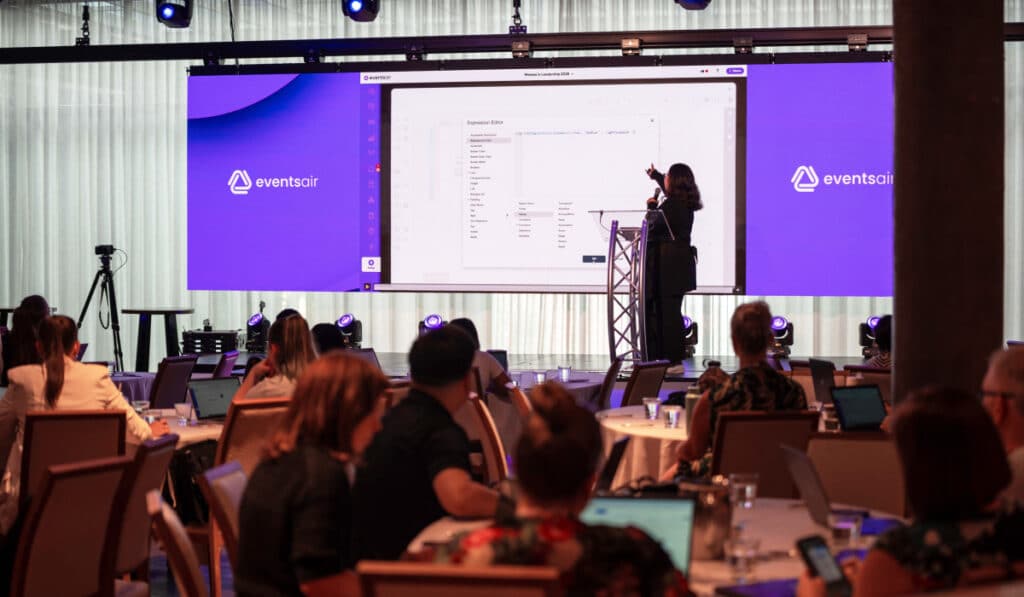Top 5 Stress Management Techniques for Event Professionals

It’s no surprise that event professionals carry the weight of stress on their shoulders. Most event planners are required to wear many different hats, all at the same time — you’re a writer, project manager, marketer, web designer, strategist, data analyst, and problem-solver. So, as you’re playing the balancing act of event management, how can you protect your wellbeing and avoid stress and burnout?
First, let’s acknowledge that stress is completely normal, and not all stress is considered bad. Eustress is an incredible motivator – it can inspire you and focus your energy. However, when you’re feeling worn out, anxious, and jittery, this level of stress is not ideal.
When deadlines are looming, lead times are fast approaching, and your registration numbers aren’t where they need to be, it’s very easy to let the stress creep in and your work hours extend.
I know what you’re thinking: Everyone does this in the event industry. We’re expected to work long hours. A little bit of stress is fine.
Sure. That might be the ‘norm’ for some event planners, but it shouldn’t have to be. In such a fast-paced environment, managing stress isn’t a luxury — it’s a necessity.
Why is stress management important for event professionals?
Stress isn’t just something you feel — it has a direct impact on how you perform. For event professionals, stress can cloud judgment, slow down decision-making, and reduce your ability to stay calm under pressure — not ideal when you’re managing speakers, sponsors, venues, and last-minute changes all at once.
High levels of prolonged stress can also lead to burnout, absenteeism, and even turnover. That doesn’t just hurt your health, it affects your entire team and the success of your events.
On the flip side, event professionals who actively manage their stress are more focused, more resilient, and better able to navigate the curveballs that inevitably get thrown their way. They’re not just surviving the event day chaos — they’re leading with confidence and creating outstanding experiences.
That means, understanding how to protect your wellbeing by reducing and managing stress will ultimately lead to a happier, healthier, more focused, you.
In this article, we’ll explore five effective stress management techniques tailored specifically for event professionals:
- Establish boundaries for work/life balance
- Manage time more effectively
- Delegate responsibilities
- Prioritize movement and mindfulness
- Reflect and acknowledge
1. Establish boundaries for work/life balance
As you’re juggling your many event hats, knowing exactly when these come off and shoved in the closet is priority #1. If you’re constantly ‘on’, always available, and ready to jump on the phone at a moment’s notice, then you’re never truly switching off.
It’s easy to neglect personal boundaries and self-care practices. However, prioritizing time for oneself is essential for long-term stress management.
Whether it’s setting limits on work hours (especially with clients), scheduling regular breaks, or indulging in hobbies and downtime, protecting your personal time is powerful. By setting and sticking to boundaries, you’ll recharge and build resilience for the busy days ahead.
2. Manage time more effectively
As a creative myself, I understand the role of planning, perfectionism, and control. When you mix that with the high-pressures stakes of events, major deadlines, and meticulous details… that is a sure-fire recipe for a stress sandwich.
This is where effective time management becomes your best friend. When you have clear tasks and deadlines mapped out, you’re much more inclined to progress, rather than get lost in the details.
Use time management techniques like the Eisenhower matrix, checklists, or time-blocking methods such as Pomodoro to create structure. Pomodoro is a personal favorite — 25-minute deep focus blocks with short breaks are a game-changer.
EventsAir allows you to map out your entire event master plan – this helpful tool lists all tasks, dates, and deadlines, allowing you to always keep track of your event’s progress. By allocating time wisely and avoiding last-minute rushes, you can minimize stress and increase productivity.
3. Delegate responsibilities
Delegation may sound obvious, but many event professionals fall into the trap of doing everything themselves. That leads to overwhelm, missed details, and eventually, burnout.
Learning to delegate tasks effectively is an important skill for stress management – especially when you can get it right and stick to it.By assigning tasks to capable team members and leaning into their strengths, you lighten your load and boost team collaboration. There is also a greater level of accountability and transparency for the entire team if you have that task visibility from the get-go.
Also consider outsourcing repetitive or manual tasks. Many tech platforms, including EventsAir, offer automation and professional services that help reduce the heavy lifting — so you can focus on what really matters.
4. Prioritize movement and mindfulness
Incorporating regular breaks and movement throughout your day is a vital tool for stress management. Whether it’s a quick walk around the block while on the phone, a 10-minute yoga session between meetings, or taking the stairs instead of the lift every day – getting your body moving releases endorphins and clears your head.
Many event planners also swear by mindfulness techniques like meditation, journaling, or gardening. These simple habits help you reset and stay grounded when event-day stress kicks in.
When you’re focusing on the present moment, it’s much easier to take a step back, decompress, and reflect on your wellbeing, rather than letting all-things-events dominate your thoughts.
5. Reflect and recharge
In the hustle of planning, it’s easy to move from one event to the next without stopping to reflect. But taking time to acknowledge your wins — big or small — helps build momentum and motivation and fosters a sense of accomplishment and gratitude.
Reflecting and recognizing your hard work and milestones helps you identify the ‘big wins’ throughout your personal event journey. Plus, acknowledging your dedication allows you to stop and smell the roses. And perhaps pinpoint the thorns.
For example, our very own EventsAir team conducts an in-depth post-event debrief after AirTime, our annual customer conference. During this debrief, the core AirTime team took the time to answer three critical questions:
- What worked well?
- What didn’t work well?
- What would we do differently next time?
Once you’re able to reflect and recharge, you may gain perspective and identify areas for growth – specifically from any challenges faced. Learning from these encounters should help you navigate future endeavors with confidence and ease.
Ensure your event technology supports you
Even though EventsAir is not a magic stress reliever, it does have a myriad of helpful event management features, and tools, to ensure you remain hyper-productive. Our team of EventsAir experts are also here to support at every stage of your event journey.
If you would like to understand how we can help you unleash the power of event planning technology for your team, then schedule a demo with one of our team members today.



